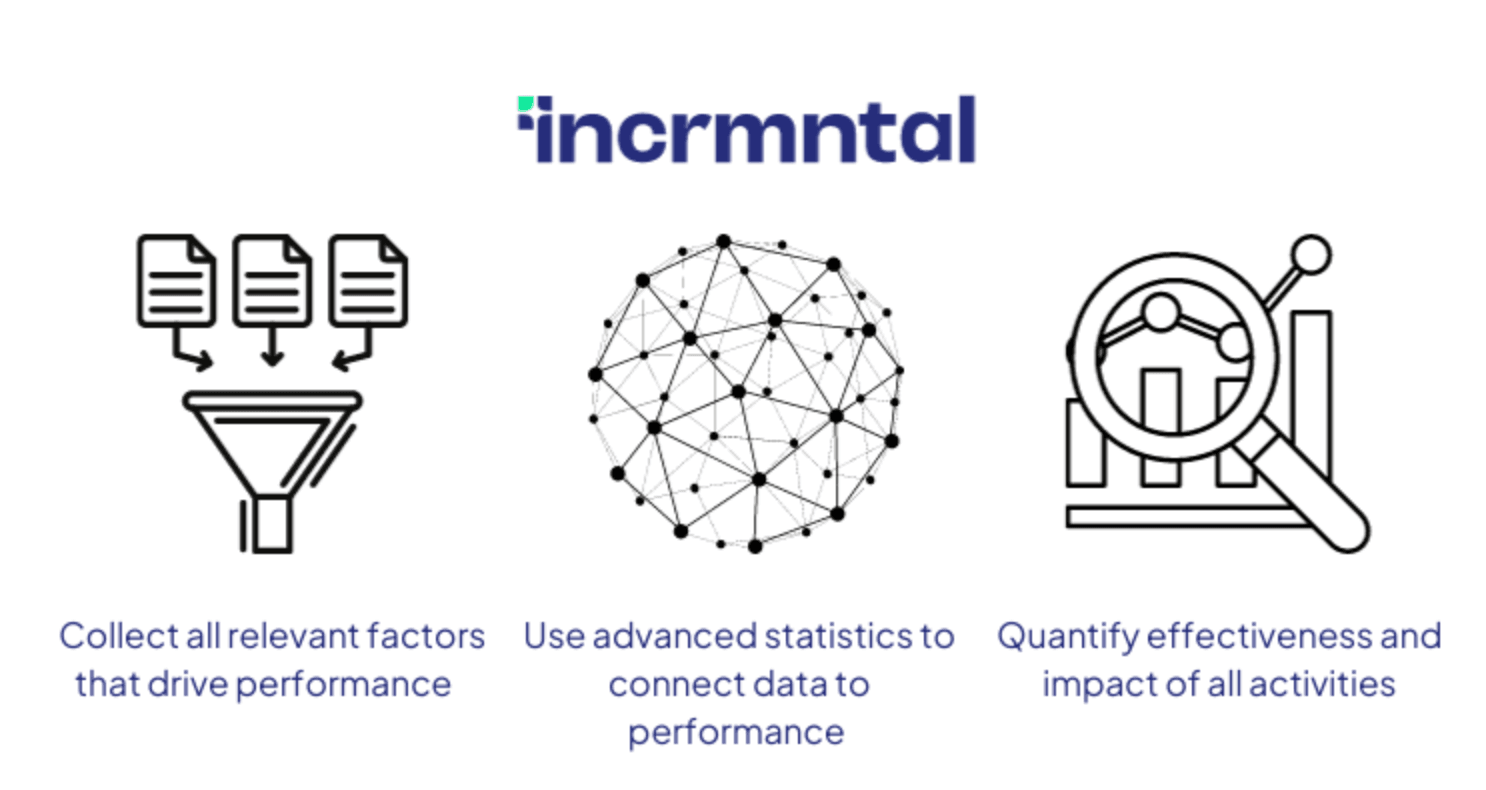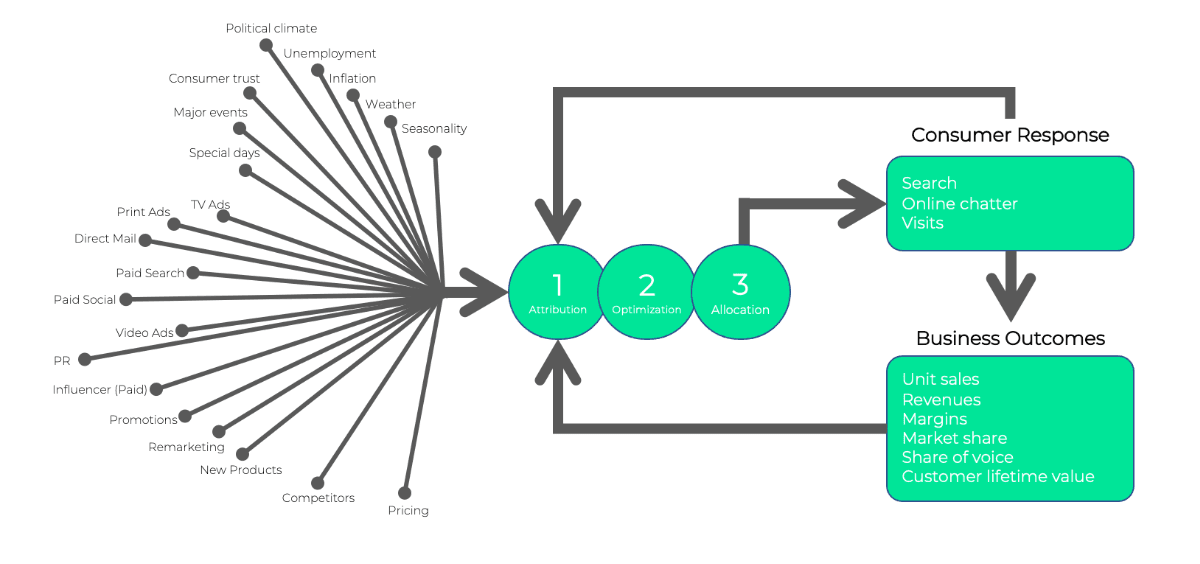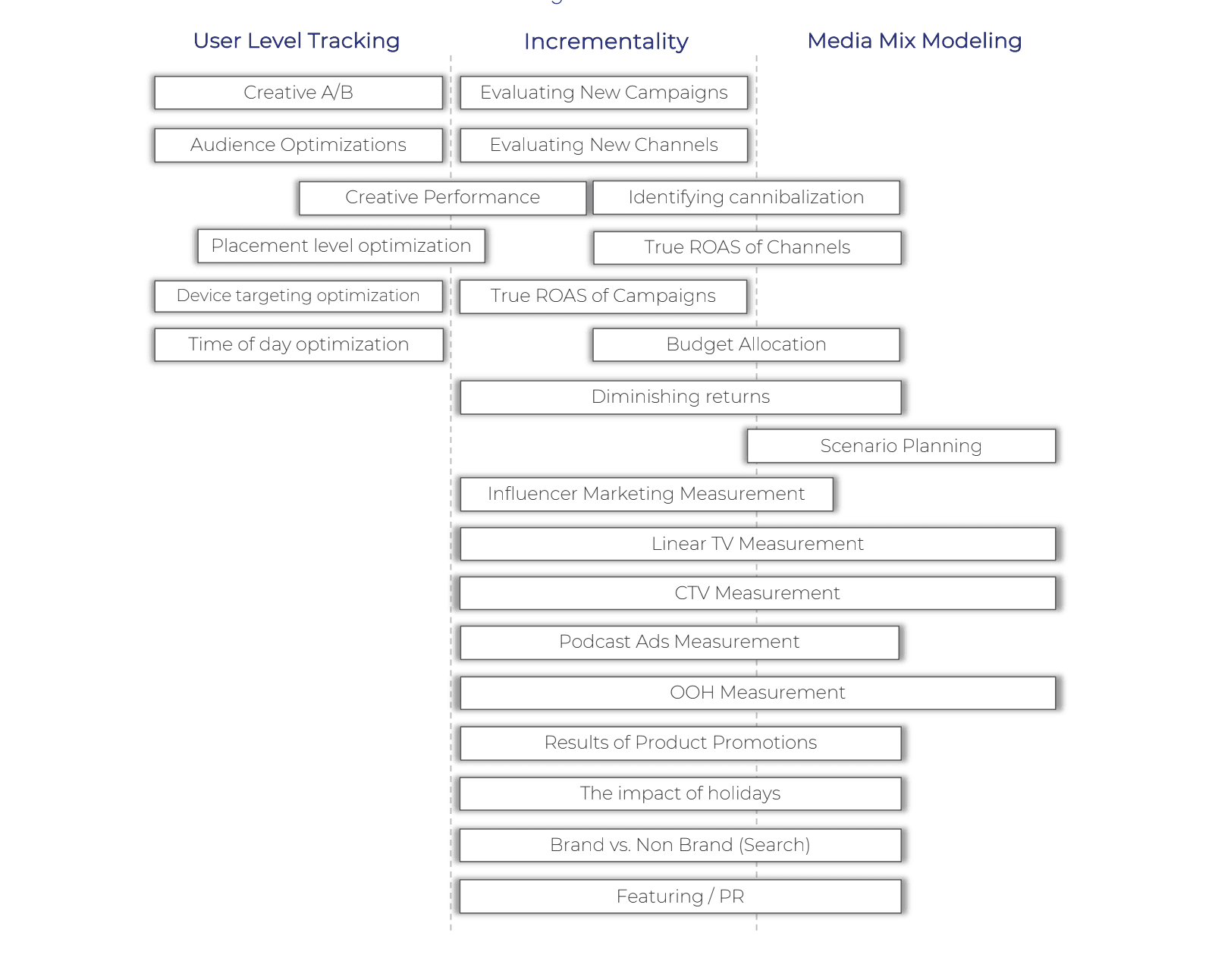Platform
Use Cases
Many Possibilities. One Platform.
AI and Automation
The Always-on Incrementality Platform
Solutions
Teams
Built for your whole team.
Industries
Trusted by all verticals.
Mediums
Measure any type of ad spend
Use Cases
Many Possibilities. One Platform.
AI and Automation
The Always-on Incrementality Platform
Teams
Built for your whole team.
Industries
Trusted by all verticals.
Mediums
Measure any type of ad spend

This article will answer the following questions:
What is Media Mix Modeling?
How Does Media Mix Modeling Work?
What is a Media Mix Modeling Platform?
What is the The Role of MMM in Modern Marketing?
How do you build MMM?
What is the difference between Digital Attribution and MMM?
What Elements does Media Mix Modeling Measure?
Media Mix Model vs. Incrementality
What are the Challenges of Media Mix Modeling?
How Do You Know The Media Mix is Right for Your Brand?
Pros and Cons of Conducting a MMM
What are Common Misconceptions About Media Mix Modeling?
Learning from History
MMM vs. INCRMNTAL platform
Media Mix Modeling (MMM) is a statistical method to estimate the impact of various marketing tactics on sales. MMM can help marketers to forecast and come up with a better marketing strategy to reach incremental lift.
The 3 stages of Media Mix Modeling:

The method was developed in econometrics for the consumer packaged goods industry and has become common with brand cross platform advertisers in the last years.
MMM was invented and developed for Marketers in sectors where selling direct to consumer represents a small part of sales usually do not have enough insights into consumer behavior, therefore, must rely on a more strategic approach to their ad spend to increase sales. Car manufacturers, Sport goods, consumer electronics, packaged goods, drinks and so on are just a few examples.
Such companies had limited access to their consumers' data, therefore, had to rely on statistical methodologies to measure the effectiveness of ad spend.

Media Mix Modeling allows you to answer a really interesting question: What will happen if you make this change?
Media Mix Modeling captures the mix of your marketing influencers, those within your control and those that aren’t, to help you build a predictable marketing strategy, allowing you to test out your assumptions and validate those by making changes to the mix.
Creating a marketing mix model requires a strong bias towards your own products. An analyst would need to know details such as changes in your product pricing, planned changes, promotions, your expected budget, as well as the past performance of your sales data based and ad spend.
While there are some frameworks offering analysis tools to develop media mix models - media mix models require customization and personalization for each company based on their own product and plans.
A Media Mix Modeling Platform is like a toolbox. It helps figure out which parts of advertising and marketing are working best and where you should focus efforts. It does this by gathering and studying all kinds of information, like where advertising, what time of year it is, what competitors are up to, and more. Then, it uses all this data to make a kind of crystal ball that can predict how future marketing decisions will turn out. These platforms are super handy for deciding how to spend your advertising budget wisely. They're especially great for industries that don't have a lot of direct info about their customers. In a nutshell, they help you make smart choices and reach your marketing goals using data.
Media Mix Modeling was almost forgotten about during the past twenty years. Digital Advertising made a bold promise to Advertisers: “Everything is trackable”. Marketing attribution platforms made Advertisers believe that their marketing activities were data driven, allowing them to lean back and watch as ad spend goes up while sales go up as well. This was true until two major things happened: the rise of attribution fraud , and the deprecation of the cookie and device identifier.
Media Mix Modeling has been around for over 60 years, with agencies consolidating reports about ad spend and tying those up with changes in the product pricing as well as conducting market research about competitor activities during an ad campaign to provide evidence that the marketing spend of an Advertiser was producing incremental results.
Media mix modeling offered a very strategic tool for agencies, allowing them to model “what will happen if we increase spend by x% ?”
While it was understood that media mix modeling is not a deterministic method of measurement - it has been used to make strategic decisions.
A smart marketer will not choose between attribution, incrementality measurement, and media mix modeling - but will utilize two or more methods to make strategic marketing decisions.
You can read more about how to use attribution, incrementality, and MMM in the whitepaper we’ve published about this topic: Download the White paper here
To build an MMM model, you would need to ensemble enormous amounts of data, going back as far as possible:
Sales, Registrations, Installs – or any KPI you wish to model
Broken down by date, country, state…
Pouring these sets of data into an MMM will create an enormous number of models with different combination of data sets, assigning different weighting to each variable while attempting to find an optimal set of variables and weights to minimize the prediction error and reach a maximum fit, to be able to plot out a reasonably high confidence set of variables that represent what is the best marketing mix in certain conditions.

There is a lot of confusion in the community between media mix modeling and attribution. The terms are often used incorrectly in conversions and even in professional articles.
Marketing attribution is a term of tracking used to determine a deterministic or probabilistic link between ad inventories acquired (impressions and clicks) and the users who perform an action within the advertisers’ domain (website or app). Creating this link, allows advertisers to have a proxy indicating how many conversions “came” from certain inventories acquired. Attribution is far from deterministic. And even when attribution uses a deterministic parameter such as cookies or a device ID - marketing attribution is not a form of measurement.
Media Mix Modeling does not claim to be a deterministic measurement method. Media Mix modeling is a strategic marketing tool allowing marketers to make decisions about how much and how to allocate budgets in order to achieve certain marketing objectives.
MMM measures essential elements to guide marketing decisions:
While Incrementality and MMM do have overlapping use-cases, remember that the main differences between MMM and incrementality is the level of granularity in the insights you can gain, as well as the frequency of the reporting. While Incrementality provides insights within days of any marketing activity, for MMM, you may need to wait at least a month or even longer.
MMM requires incrementality for calibration, and best practice to apply an MMM model is to utilize priors in MMM to establish some sort of a baseline for the assumptions made.
We created a Matrix to help you know which methodology you should refer to when handling various use-cases.

Media Mix Modeling, valuable as it may be, comes with its own set of challenges:
To find the perfect media mix for your brand, start by setting clear goals and knowing your audience well. Analyze your past marketing data and don't hesitate to experiment with different media combinations. Be mindful of your budget and stay updated on what your competitors are doing. Track your results and be ready to adapt as needed. Customer feedback and market research can also offer valuable insights. Consider consulting experts and regularly review and refine your media mix to ensure it aligns with your evolving brand goals and market trends. It's all about finding the right balance that connects with your audience and drives success for your brand.
There is no one size fits all for marketing measurement and requires an understanding of the pros and cons the MMM methodology
Most significant Strengths:
(Synthetic) ground truth - MMM uses historical data and trends in performance to estimate the contribution of each channel performance, creating a synthetic ground truth (estimating the value of a channel)
Budget planning - MMM’s most useful functionality is for the purpose of budget planning
Scenario planning - Creating hypothetical budget planning scenarios to reach certain objectives
Most significant Weaknesses:
Requires enormous amounts of historical data - Not suitable for new products, or products with less than 2 years of non-significant data sets
Limited granularity in reporting - Granularity in reporting is limited to medium (search, social, etc), or channel, at best
Relies on Priors / Posteriors - MMM requires multiple experiments or prior data. Priors could be belief, or user level attribution oriented
Media mix modeling has been used recklessly in our industry, especially during the last few years. Following the deprecation of the IDFA the industry resorted to term-dropping, using media mix modeling as an alternative solution to attribution.
Media mix models are not a replacement for attribution. Media mix (or MMM) is a strategic marketing tool to allocate budgets wisely in order to reach certain marketing objectives.
Media Mix Models require historical data to have any helpful outputs. Often, the data needs to include external influencing factors such as competitors activity, product launches, financial events, weather and any major event that may have influenced the performance of a product (i.e. during an Olympics year, more people buy sport goods).
Due to these requirements - Media Mix Models work best for refining a strategy, expecting influencing factors such as changes in the media mix and/or external factors to help understand what would be the best media mix to market a product over time.
Media Mix does not work well for new product launches, as without historical data - there are simply too many unknown variables.

B2B2C brands (i.e. consumer goods, retail, consumer electronics) often must rely on Media Mix Modeling to analyze the effectiveness and impact of their paid marketing activities.
Attempts to use a simple version of Media Mix Modeling are tested regularly by Advertising being turned off completely , allowing Advertisers to analyze sales activities with no Advertising in place - however, switching off all Advertising is extremely hurtful to most Advertisers as while doing so - competition may consume market share, thus, hurting long term brand equity for an Advertiser experimenting with turning off the lights across all marketing activities.
INCRMNTAL provides an incrementality measurement platform, helping both brand and performance marketers unlock the value of their marketing spend. Our platform is not a replacement to media mix modeling, but works adjacently to it.
If you want to learn more, visit INCRMNTAL or book a demo today!
| Question | INCRMNTAL | MMM |
|---|---|---|
| Can it measure marketing activities even if there are many changes happening in marketing? | Yes Since our platform utilizes marketing activities AS micro-experiments - it allows our platform to continuously measure even small changes happening in a "noisy" enviornment | No MMM requires gradual and non frequent changes in order to measure the value of channels. |
| Can it work without user level attribution data ? (i.e. Priors) | Yes Utilizing marketing activities as micro-experiments (or "inferences") the platform does not depend or rely on any user-level/channel attribution data, and can provide the incremental value of both channels, campaigns, an ad groups | No MMM relies on prior knowledge, or a prior estimation of the value from each channel. While utilizing attribution data as a prior - a company will be creating a compounding effect due to the faults of over/under attribution data |
| Can it measure the value of campaigns? or only channels? | Yes INCRMNTAL can measure at the level of campaigns and even ad groups. A marketer can measure a specific ad group, running in a specific country, and targeting a specific platform (i.e. iOS, Android, Web). | No MMM depends on large significnat data sets, therefore, is usually run on a medium basis (i.e. "Search", or "Social") and cannot even differentiate Google, Bing, Facebook, TikTok, Snapchat, Apple Search Ads - let alone on a Campaign Level or more granular than that. |
| Can it measure the value of a new channel launched? | Yes Incrementality is the easiest and fastest way to understand the value of a new channel. | No MMM would require a large spend and patience before it can incorporate and evaluate the value of a new channel. ±4-6 weeks of significant ad spend |
| Can you measure without stopping a channel for some time ? (i.e. Experiments) | Yes INCRMNTAL's methodology allows companies to measure activities such as bid/budget increase, bid/budget decrease, without needing the marketer to pause and restart the channel to calibrate the model. | No MMM specifically requires holdout experiments (i.e. stopping a channel for some time) to continuously calibrate the model. |
| Can it measure channels where traffic quality is volatile ? (i.e. Programmatic) | Yes With no prior and no assumption of the value any channel or campaign yields - INCRMNTAL measures every activity with no bias in the model. If you've changed bidding strategy within a DSP, or even on your Search Campaigns - INCRMNTAL will show the incremental value you gained/lost as a result of this change, taking seasonality, and all other marketing changes in question. | No MMM assumes that the value of a channel does not change on its' own, but may only indicate if the MIX of channels are yielding certain outcomes |
| Does "Organic" traffic have any value in the model's estimation? | Yes INCRMNTAL differentiates the value yielded by Paid traffic vs. Organic, and can (and does) split the distribution between what Paid channels yielded, and what Organic did | No MMM attributes all of the value to Paid channels |
| Can you measure a specific marketing activity? (i.e. new campaign launched on Google) | Yes INCRMNTAL has two modes: Explore, and Autonomous. In Explore, you can measure any change you've made in marketing! | No MMM model is a "black box" that looks at the mix of all channels in correlation with the results. |
| Does it have a really easy to use UI? | Yes INCRMNTAL is extremely proud of the UI, being intuitive and simple to use, while still providing power users with modeling visualization, and API access | Yes & No MMM's output is simple to read, however, the "behind the scenes" is a black box, since MMM runs hundreds or often thousands of models to come up with a Beta variable to be used |
| Can you measure the effect of an External event ? (i.e. What was the impact of a price change? promotion?) | Yes INCRMNTAL allows you to incorporate external or internal activities such as: price changes, promotions, holidays, tech issues, competitor launch, etc... | No MMM may take variables into consideration (i.e. price volatility), but will not allow you to measure the specific impact of a price change, or anything else for that matter |
| Does it fit to companies who only launched their product in the last 3-4 years? | Yes INCRMNTAL requires only a minimum of 40 days to start providing incrementality insights | No MMM requires a minimum of 12 months of data at scale, and is mostly suitable for companies with a product that's been in market for over 5 years |

Maor is the CEO & Co-Founder at INCRMNTAL. With over 20 years of experience in the adtech and marketing technology space, Maor is well known as a thought leader in the areas of marketing measurement. Previously acting as Managing Director International at inneractive (acquired by Fyber), and as CEO at Applift (acquired by MGI/Verve Group)